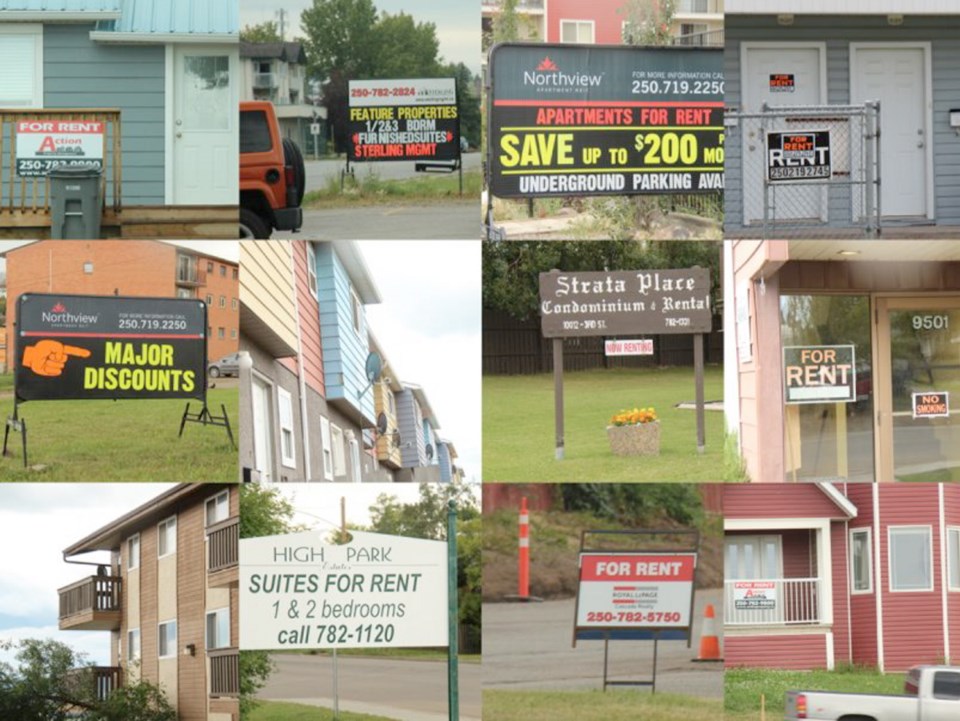Lita Powell doesn't mince words when she talks about the Fort St. John rental market in 2014.
"The general feeling was just panic," said Powell, who has managed property in Northeast B.C. since the 1980s. That year, rents were among the highest in the province outside the Lower Mainland, driven by promises of a liquefied natural gas boom. Few if any units were available, while investors poured money into new apartments, duplexes and suites.
"I describe the work environment and the rental environment as hysteria," Powell recalled. "Everybody was responding to the big companies: drill faster, work harder, we need more."
Now, nearly 18 months after the first signs of an economic downturn in Northeast B.C., renters have more choice than ever, and landlords are feeling a sense of whiplash.
"We went from an absolutely ludicrous landlord's market to a really generous tenant's market in a few months," said Kevin Kurjata, a Dawson Creek realtor and landlord.
The Canada Mortgage and Housing Corporation (CMHC), which tracks average rents and vacancy rates, won't release new data on Dawson Creek and Fort St. John's rental markets until the fall, having cut its spring survey.
But by October 2015—the most recent month for which data is available—the rental market was feeling the effects of the crash in oil and gas prices.
"Anyone who was watching world (commodity) prices, world events, world economies, started to get a really clear picture of where we were going," Powell said.
Dawson Creek and Fort St. John had the highest apartment vacancy rates in B.C. that month at 14.6 and 12.1 per cent, respectively. A year before, those rates sat at 5.3 and 2.5 per cent, according to the CMHC.
In spring of 2014, Fort St. John had an apartment vacancy rate of just 1.5 per cent. In Dawson Creek, three of every four residential units built between 2012 and 2015 were rentals, according to Kurjata.
"I saw the oversupply issues coming," he said. "I did not see the demand vanishing at the same time."
Powell, who worked for the CMHC before founding Li-Car Property Management Group, said official vacancy rates don't take into account properties with fewer than three units — leaving out duplexes, homes with suites and other types of rentals.
When those properties are accounted for, Fort St. John's overall vacancy rate is now closer to 30 per cent, she said, with more rental units set to come on the market in the coming months.
Rental companies continue to drop rents to hold on to tenants.
Daniel Martin, who works as a medic in the oilpatch, said his landlord has knocked hundreds of dollars off the two-bedroom apartment he shares with his fiancé.
In some cases, the property management company has renegotiated leases with people in his building who have been recently laid off
"They decided it's better to lower the rent and have people pay instead of not paying the rent at all," Martin said.
"Everyone's feeling the crunch, even the superintendents (at work)," he added. "It's flowing to everybody, so it was only inevitable the landowners themselves would have to take a cut."
Kurjata, who rents a pair of duplexes, faced also faced that choice.
"I have units that I haven't changed, but I didn't change them while rents were going up either. They've been moderately priced the entire time. Then I have units that are down by more than half because they were exorbitant."
Powell said that in some ways, she's happy to see the market cool off.
"When you have a zero per cent or a negative vacancy rate, no one benefits in the long run," she said. "The tenant turnover is so fast landlords can't get in and do the necessary repairs and upgrades. You get slack on checking your references. It's just not a good environment."
But the weak rental market has left homeowners with few ways out if they lose their jobs. Powell has heard from more than a dozen families this month who faced a stark choice: find a tenant or lose the home.
"I ask them what their expectation for rent is and they say 'for $1,800 I could do it.' I have to tell them 'I'm really sorry, but that's not the magic number.' You can hear the panic in their voices."
Without a new outlet for B.C.'s natural gas, she's not sure when the market will stabilize.
"This is deep," she said. "I don't think we've seen the bottom yet."



